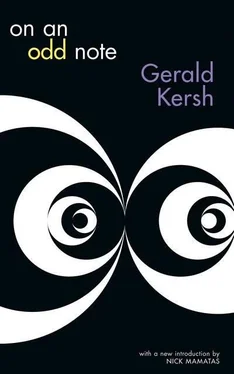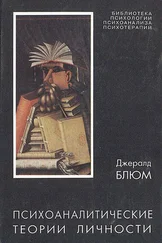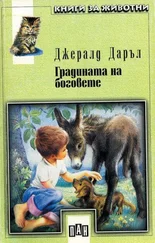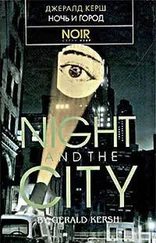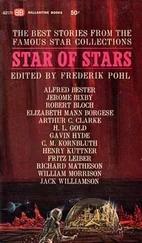“What, in Arabic?” I said. “That would have been too subtle for ‘Swindle-sheet’ Morris. Besides, remember, this was before the war, back in 1939.”
“Of course,” said Kem, “I must take in consideration the fact that you, also, are a bit of a joker, and might be playing a trick on me.”
“I give you my word of honor I am not!”
“Well, really,” said Kem, “all I can say is that it’s very strange. . . .” He passed me a piece of paper upon which he had been making notes. “Here is what you gave me translated back. It is , unquestionably, pure Arabic. I suggest we regard this as a Fleet Street hoax, Gerald; it will be healthier that way.”
And so let it be regarded.
. . . But I wish I knew exactly what Bohemund Raymond, or whatever spirit it was that possessed him, meant exactly by those last two lines. . . . We must wait until 1995, and see. . . .
The monotony of the plain becomes so heartbreaking that you would thank God for the sight of a withered tree. The land lies flat. The road forks and runs away into the unknown distance. Look east, look west; there is nobody, nothing but dust and grass and a dry, melancholy wind which twists the clouds into tortured shapes. The plain is mournful and legend-haunted.
Dig in it and you may find strange things: skulls scored with scars, bits of metal, defaced coins, weapons which at a touch fall to green powder. It swallows men like a sea. The Tartars passed this way, with the flat-faced riffraff of the Bad Lands. “Where my horses’ hoofs have passed no grass grows.” But grass has grown; the grass always wins in the end, and it covers everything, humbly bending before the wind, but savagely clutching the earth with its roots—bitter, gluttonous Puszta grass that devours the soil.
I say the road forks and is terribly lonely. But a few paces away from the point at which it divides there stands a stone, incalculably ancient, roughhewn into a rectangular shape, burying itself by its own weight . . . “digging its own grave,” as they say in these parts.
It used to lie flat. Now it stands erect. In the place where it used to lie there is a deep hole. Grass has begun to encroach on the stone itself. The hard, pale surface sprouts sparse tufts like an old man’s chin. These tufts somehow make the stone look older. By moonlight they give it an appearance of something grotesquely like life.
Three sides of the stone are marked with inscriptions. Bend sideways and you may read initials, names and broken phrases in all the languages of the earth: J . H .; M . B . Hunyadi ; several crosses; “GOD WILL PUNISH THEM,” in ancient Slavonic. In one corner somebody has laboriously hacked out a heart and an arrow. Roman, Greek, Russian, Tartar, Georgian—all alphabets may be found there. There is even the name of one FA’OUZI , beautifully carved in curling Arabic. To whom did these names and symbols belong? Only God knows.
The time will come when even these desolate marks will have been rubbed away by the rain and the dust, and then there will be nothing but the tired old stone, imperceptibly disintegrating atom by atom in the loneliness of the plain at the fork of the dreary road.
Why was the stone dropped there? For centuries nobody knew. Tramps used it as a seat, a bed, a kitchen and a meeting place. The friction of their bodies alone had worn little hollows in it. Their weight had helped to press it down. Their names were cut into it. They had nothing but names to leave. Some of them, no doubt, were so poor that they had no names. Men and women who lived and died up and down the interminable roads of Europe; people beyond society; lost souls; the forgotten of God; men without hope; eaters of garbage; beggars for charity; people who lived on their sores and deformities; bear trainers, lone bandits, wandering musicians and contortionists—they all rested on that stone, left their marks if they had marks to leave, and went their ways to their unknown graves.
The plainsmen call it The Beggars’ Stone, to this day.
One evening in 1906, two men met at the stone. The first had only one leg. He was a short, squat fellow, wrapped in rubbish, crowned with a cowman’s round hat which pressed his ears down, and bearded until he resembled a gray mildewed vegetable rather than a man. The other had an air of crime and misery. Life had crushed him dry and flat, like a grape in a press. His face was a Rosetta Stone of bygone violence—it bore the cuneiform scars of a hatchet, the hieroglyphics of a knife, and the queer marks of broken glass. People had tried to kill that man. He was beyond hope and fear.
“Good evening,” he said.
“Good evening.”
“Cold.”
“Bitter,” said the one-legged man, nursing his stump.
“Come far?”
“Far enough. And you?”
“Far enough. Where are you heading for?”
“Buda, maybe. You?”
“Maybe Buda. What’s your name? They call me Bicskas.”
“Probka.” The one-legged man sighed. “Well, the stone still lies here. Many’s the night I’ve slept here.”
“Me too. See that dent? It fits my head. It might have been made for me.”
“Nice soft stone,” said Bicskas, grinning. “It’s kind of them to let us have even this much. Ha! A stone. I see you pick the south side. You’re no fool. You know the ropes. Good. Have you got any food?”
“I’ve got some bread,” said Probka.
“I’ve got some bacon,” said Bicskas.
“I’ve got some wine,” Probka pulled out a bottle.
“We can have a banquet,” muttered Bicskas, grinning again. “Look at this.” He displayed the stumps of five cigars.
“Things were not always like this, Bicskas, my brother-in-law.”
“You’re right. Bacon, bread, wine, cigars. What more could you want? Geese?”
“What I mean to say is, I wasn’t always poor like this.”
“Who cares?” said Bicskas. “However poor you are there’s always a consolation. Somewhere there’s someone poorer. You have always got something somebody else wants. I’ve seen a man knifed in the back in Medvegy’s Cellar for a boot—one old boot with a hole in the sole. Good, that, eh?”
“Medvegy’s Cellar; that’s in Budapest.”
“In the spring, if you hang around the hotels—my dear sir,” said Probka, “you’d be surprised at the things they throw away. Many’s the leg of fowl I’ve got out of the dustbins in Budapest in the spring.”
“Leg? Once I found a half a duck. I dusted it off a bit and there it was, like new. They’ve got so much, these people, they don’t know what to do with it. So they chuck it in the dust hole. It had some sauce on it, too.”
“I once found a whole chicken,” said Probka.
“Yes? I once found a goose, a whole goose, in a copper pan.”
“You lie,” he said distinctly.
“Say that again.”
“Bah.” Probka uncorked the bottle. “I know a man who was in Berlin once, and so one day he happens to open up a dustbin and finds—guess what! A ham. I tell you, a whole ham, only a little bit off. But give me sausage.
“In the old days,” said Probka, “I used to eat a lot of sausage, a kind of special sausage made with goose-fat and garlic.”
“Millionaire,” sneered Bicskas.
“I used to have a rag-and-bone business.”
“You needn’t try to come over me with your rag-and-bone business. I used to be chucker-out in the Café Cseh. I had a blue uniform. I nearly bought a watch.”
“By God,” said Probka, “it grows cold. I bet neither of us lives through the winter.”
“I have also been a coachman. I had some proper boots then, I don’t mind telling you.”
“We ought to have a fire,” said Probka.
Читать дальше
